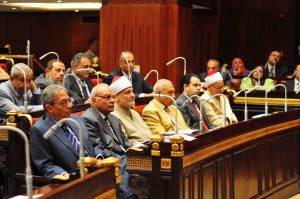
The Supreme Constitutional Court (SCC) chairman, Maher Al-Behairy, announced the court rejected draft constitutional articles defining its powers at a press conference on Tuesday.
The Constituent Assembly, tasked with drafting the new constitution, released the draft constitution on Sunday night before it being voted upon in a popular referendum.
“The draft constitution minimises the role of the SCC in protecting rights and freedoms,” law expert and professor at Cairo University, Ra’fat Fouda, said. He added the draft constitution does not conform to the court’s nature or its jurisdictions.
In its statement, the SCC refused to be placed under the judicial chapter of the constitution’s public powers section, explaining that it should have its own chapter in the constitution as it was independent from the judiciary, reported state-owned news agency MENA.
The statement said the draft constitution failed to address three major jurisdictions of the SCC; ruling on contradictions between final verdicts, ruling on conflicts in applying the Constitutional Court’s decisions, and ruling on the requests of the court’s members.
The SCC refused article 183, which states the SCC’s members are chosen by the general assemblies of the SCC, the Cessation Court, the Appeals Courts and the State Council, to be ratified by a presidential decree. The SCC said the president’s role in approving SCC members is unprecedented measure and allows the executive power to overstep the judiciary. It added its reservation giving the Cassation Court, State Council and Appeals Courts the right to choose the SCC’s members, when the SCC does not choose their members.
Article 184 of the draft constitution was also a subject of contention, stipulating the SCC decides upon the constitutionality of draft laws only before their issuance and not afterwards. The SCC stated this article would make its verdicts not binding to the legislative authority.
The SCC also disapproved of draft article 182 which states that the SCC has the jurisdiction to rule on the constitutionality of a case, but not on the substance of the case itself. This is a jurisdiction the SCC had never claimed to possess and thus saw its inclusion as unnecessary.
Fouda stated people aren’t aware of the SCC’s job and the dangers they could face should it be tampered with.
“The SCC’s stance would definitely affect the votes of the aware citizens,” Fouda said, “yet those whose votes are guided by their religious tendencies will only end up losing.”
“The Muslim Brotherhood’s goal is to undermine the SCC,” said Hossam Eissa, constitutional expert and law professor at Ain Shams University, adding that the Brotherhood’s enmity to the SCC was clear from the moment president Mohamed Morsy won the presidential elections and the Brotherhood refused to have him swear the oath in front of the SCC.
Other judicial bodies have voiced their objection to certain articles of the new constitution. The administrative prosecution demanded to be named a judiciary power with a clear jurisdiction in the constitution, a demand met after a meeting between Constituent Assembly head, Hossam El-Gheriany, and representatives of the Administrative Prosecution Club (ACP). The same meeting also involved representatives from the state litigation authority chancellors’ club, who withdrew due to differences with the Constituent Assembly about their role in the draft constitution.
